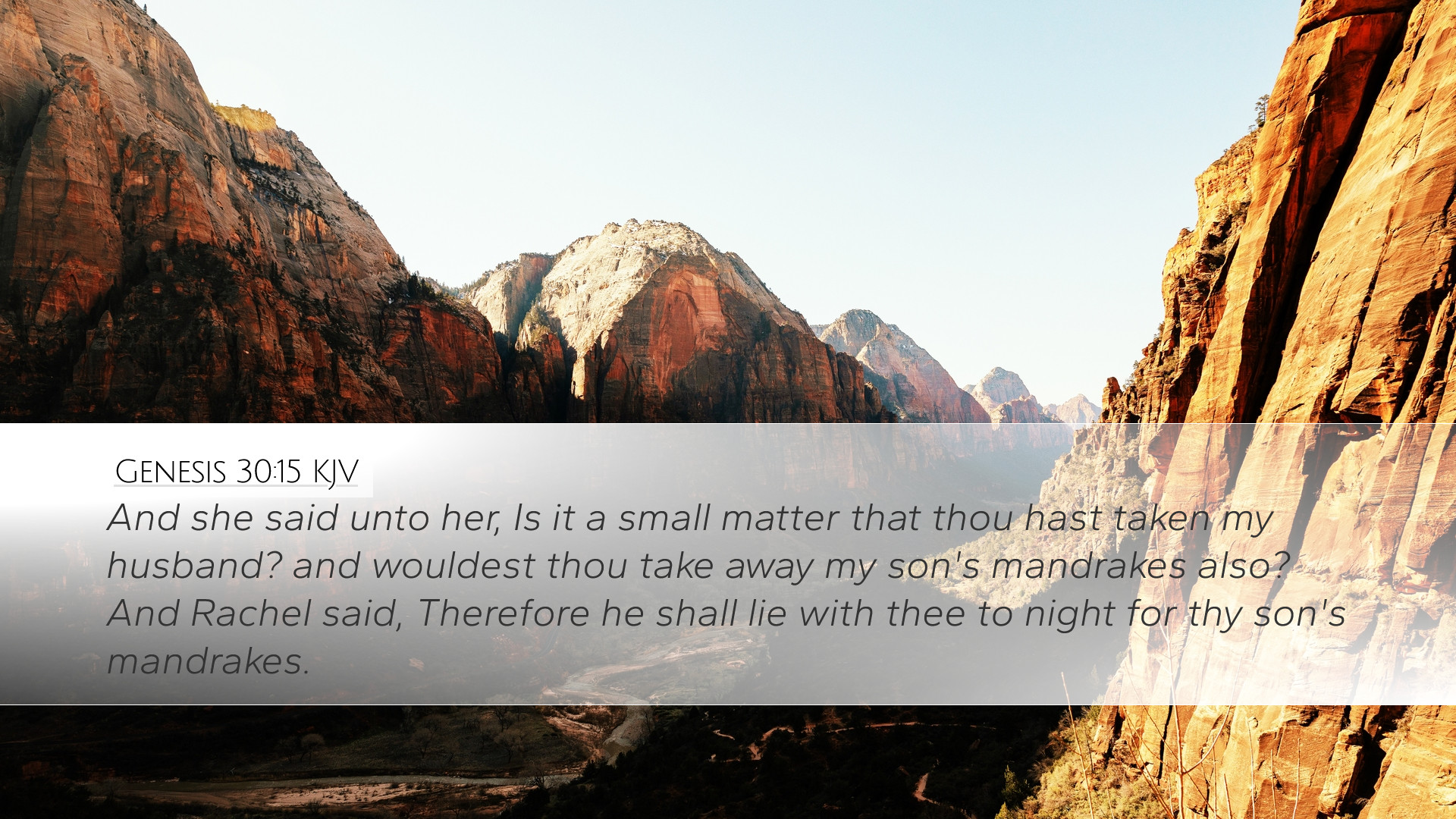Commentary on Genesis 30:15
Verse: “And Leah said unto her, Is it a small matter that thou hast taken my husband? and wouldest thou take away my son's mandrakes also?” (Genesis 30:15, KJV)
Introduction
This passage marks a significant moment in the narrative of Jacob's family dynamics, reflecting deep emotional undercurrents and issues of rivalry. Leah's exclamation captures her anguish and highlights the complexities of her relationship with Rachel, her sister, and Jacob, her husband. In analyzing this verse, we draw insights from esteemed public domain commentaries.
Contextual Background
The events leading up to this moment are essential for understanding Leah's statement. Jacob, having been deceived into marrying Leah before Rachel, now faces a household filled with tension and competition. The mandrakes, a fertility aid of the time, serve as a focal point for Leah and Rachel's rivalry.
- Leah's Situation: Leah feels overshadowed by Rachel’s beauty and favored status, creating a sense of inadequacy. The births of her children do not bring her the affection she longs for from Jacob.
- Rachel's Desire: Rachel’s infertility leads her to seek the mandrakes, symbolizing her desperate hope for children, which intensifies the competition with Leah.
- The Mandrakes’ Significance: In ancient cultures, mandrakes were believed to possess magical properties related to fertility, representing hope and desire for progeny.
Commentary Insights
Matthew Henry
Henry observes Leah's emotional turmoil, focusing on her plight as a woman who, despite being blessed with children, feels rejected. He interprets Leah’s questioning of Rachel as a manifestation of deep-rooted jealousy and bitterness. Henry notes that Leah's words reflect the troubled relationships within the family—her resentment towards Rachel's perceived privilege and the depth of her own suffering. This verse, according to Henry, encapsulates the struggles women often face in patriarchal societies, especially in their zeal for acceptance and love.
Albert Barnes
Barnes emphasizes the tension present in this domestic setting, noting that Leah's strong reaction indicates not just jealousy but a sense of betrayal. He points out that Leah's usage of the phrase “small matter” suggests a bitterness stemming from perceived injustices. Barnes elaborates that Leah’s bitterness towards Rachel for taking Jacob accentuates the pain inflicted by familial discord. He highlights how this situation illustrates human propensity for conflict, often arising from desires unfulfilled and relationships marred by envy.
Adam Clarke
Clarke provides a detailed analysis of the cultural implications surrounding the mandrakes. He identifies them as symbols of hope, often sought after by those in Rachel's position. His commentary suggests that Leah's confrontation with Rachel reveals insights into the social dynamics of the time, wherein the ability to bear children was directly tied to a woman's worth. Clarke concludes that Leah’s outcry points to a broader theological theme: the struggle for identity and worthiness in a patriarchal framework, revealing the inner psychological battles faced by women in such contexts.
Theological Implications
This verse serves as a microcosm of larger themes found throughout scripture, particularly regarding the human condition:
- Human Rivalry: The ongoing tension illustrated in this passage reflects the broader human experience of rivalry and competition for love, status, and acceptance.
- Divine Providence: Leah's pain and Rachel's yearning underscore the idea of God's sovereign hand in guiding and shaping family dynamics, often through trial.
- Feminine Struggles: The passage invites contemplation on women's roles and their struggles for recognition and value within both familial and societal structures.
Contemporary Applications
For pastors, students, and theologians, the commentary on Genesis 30:15 encourages the exploration of contemporary issues surrounding family dynamics, such as:
- Understanding Rivalries: Grappling with jealousy or competition within both church and family settings.
- Reflection on Identity: Recognizing the significance of identity and value in Christ amidst societal pressures.
- Empathy in Relationships: Promoting compassion and understanding among individuals experiencing similar conflicts.
Conclusion
Genesis 30:15 encapsulates both a personal and communal struggle within Jacob's household, reflecting timeless themes of rivalry, desire for acceptance, and the quest for identity. The insights gleaned from public domain commentaries by Matthew Henry, Albert Barnes, and Adam Clarke provide a multifaceted understanding of this verse, inviting deeper theological exploration and practical application for today’s believers.


